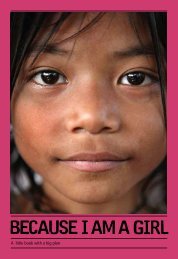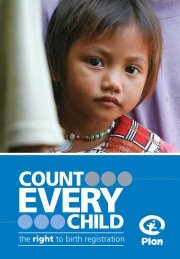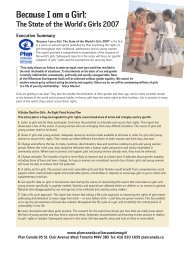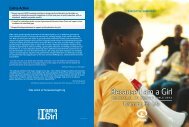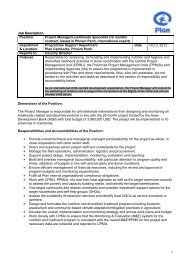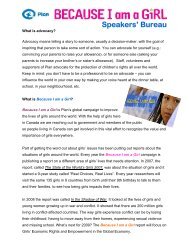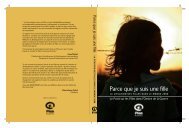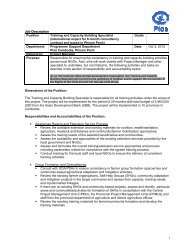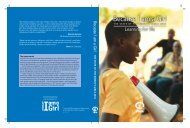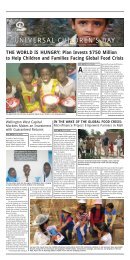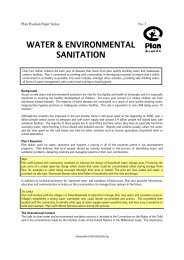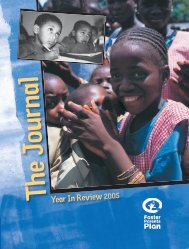Plan Worldwide Annual Review and Combined Financial ...
Plan Worldwide Annual Review and Combined Financial ...
Plan Worldwide Annual Review and Combined Financial ...
You also want an ePaper? Increase the reach of your titles
YUMPU automatically turns print PDFs into web optimized ePapers that Google loves.
<strong>Plan</strong>’s global spend in 2012<br />
€39 million<br />
Indonesia<br />
Preparing young people for<br />
good jobs<br />
Paraguay<br />
Children learn to manage financial <strong>and</strong><br />
natural resources<br />
€<br />
Togo<br />
Village savings groups offer health<br />
insurance<br />
ECONOMIC SECURITY<br />
In Indonesia, eight million young people under the age<br />
of 24 – nearly 20 per cent of Indonesia’s young people<br />
– are unemployed <strong>and</strong> unequipped for work. This makes<br />
them vulnerable to poverty, hazardous lifestyles <strong>and</strong><br />
exploitation – especially girls. <strong>Plan</strong> works at the highest<br />
levels <strong>and</strong> in local communities to provide unemployed<br />
young people with the vocational <strong>and</strong> life-skills training,<br />
job opportunities or financial services they need to get<br />
a job or start viable businesses.<br />
As a result of our advocacy, Indonesia adopted our<br />
Youth Economic Empowerment approach (YEE) in<br />
its National Action <strong>Plan</strong> for Youth Employment <strong>and</strong><br />
integrated it into its Development <strong>Plan</strong> for 2010-2014.<br />
The World Bank also recommended YEE as a model for<br />
international organisations.<br />
Meanwhile, a public-private partnership between YEE,<br />
Indonesia’s National Development <strong>Plan</strong>ning Agency <strong>and</strong><br />
other government agencies is enabling 12,000 young<br />
people – 90 per cent of them female – to find good<br />
jobs through integrated skills training, competency<br />
certification <strong>and</strong> job placement. Sari Pujiastuti, a<br />
21-year-old woman, said: “I really liked the YEE lifeskills<br />
training. It taught me to speak out in public<br />
<strong>and</strong> ask questions. So, in my current work, if I’m not<br />
clear about something, I’m not shy to ask.” Sari now<br />
works as a sewing operator in a garment factory.<br />
In Guairá state, children are discovering that the right<br />
to economic security <strong>and</strong> the responsibility to preserve<br />
natural resources go h<strong>and</strong> in h<strong>and</strong>.<br />
Working with the state Ministry of Education <strong>and</strong> Culture<br />
<strong>and</strong> local NGOs, <strong>Plan</strong> is providing social <strong>and</strong> financial<br />
education to empower children to take action in their<br />
communities, manage resources wisely <strong>and</strong> develop<br />
skills that will make them economically independent.<br />
We have delivered training in social <strong>and</strong> financial<br />
education to 150 teachers in 29 schools. As a result,<br />
1,200 children aged six to 14 are learning about issues<br />
including personal development, their rights, how to care<br />
for the environment, <strong>and</strong> how to plan for the future.<br />
“Our goal is to work with <strong>Plan</strong> in every community<br />
within our state,” says the Secretary for the<br />
Environment in Guairá. “We are looking for people to<br />
become interested in natural resources. Changing<br />
attitudes is easier if we educate children. They show<br />
great enthusiasm <strong>and</strong> encourage adults to maintain a<br />
healthy environment.”<br />
The Ministry of Education <strong>and</strong> Culture has established<br />
a technical team to incorporate social <strong>and</strong> financial<br />
education into the state curriculum <strong>and</strong> will share results<br />
with other states, with a view to incorporating the<br />
programme in the national curriculum.<br />
In Togo, children are often denied their rights, including<br />
the right to healthcare, because of poverty. To enable<br />
households to save for urgent needs, invest in incomegenerating<br />
activities <strong>and</strong> pay for healthcare, education,<br />
water <strong>and</strong> sanitation, <strong>Plan</strong> established 1,070 village<br />
savings <strong>and</strong> loan associations in 151 communities.<br />
Of the 27,000 members, 82 per cent are women.<br />
Even with their improved finances, few of the members<br />
could afford health insurance. So we introduced<br />
community health insurance for association members<br />
in two districts, working in partnership with international<br />
NGO Louvain Développement, local NGOs RADAR <strong>and</strong><br />
ADESCO <strong>and</strong> the Togolese Government. The scheme<br />
was so successful that we have now extended it to three<br />
more districts.<br />
Tchilalo Atche Simtaro, 25, joined an association in 2009.<br />
She took a loan to sell beer <strong>and</strong> charcoal <strong>and</strong> began using<br />
the profits to pay for health insurance. When she was<br />
pregnant with her youngest child, Maurice, she needed<br />
a caesarean. The insurance covered the entire cost, plus<br />
setting the baby’s broken bone.<br />
“I could have died, <strong>and</strong> my baby too. Our lives are<br />
changing, <strong>and</strong> we are happy,” says Tchilalo. “My baby<br />
is healthy, I am healthy too.” Her husb<strong>and</strong> Akparo<br />
agrees, adding: “Today we’re not afraid to go to<br />
the hospital.”<br />
‹ Members receiving loans at a village savings <strong>and</strong> loan association meeting in Burkina Faso<br />
27



